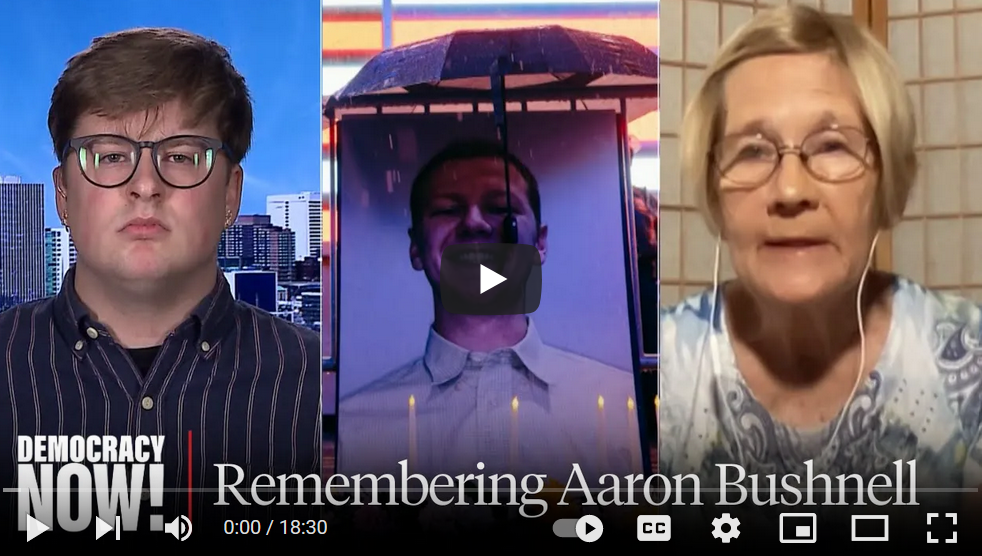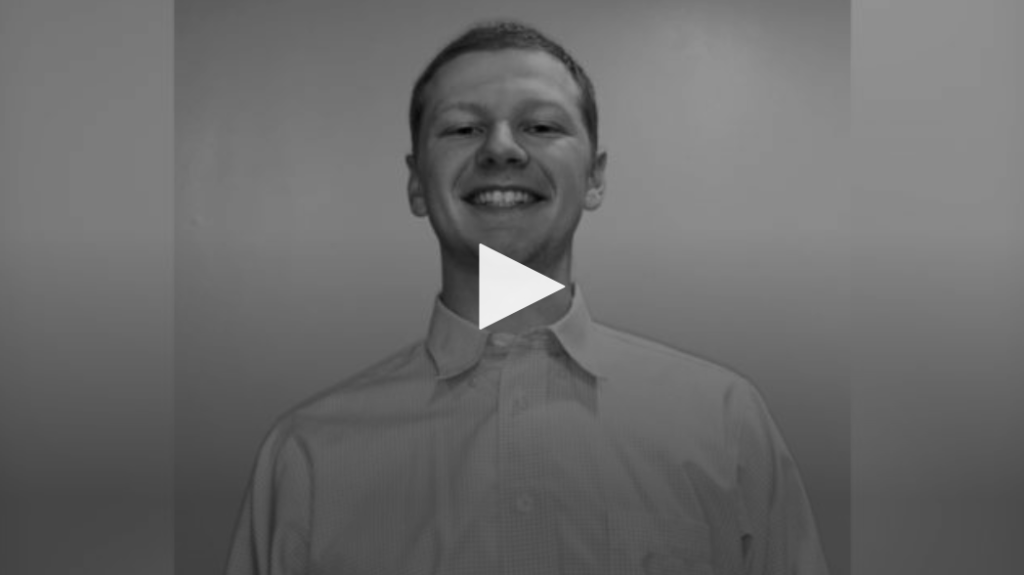
From Democracy Now | Original Article
In an act that has captured the attention of the world, Aaron Bushnell, a 25-year-old active-duty member of the U.S. Air Force, set himself on fire outside the Israeli Embassy in Washington Sunday to protest Israel’s assault on Gaza and U.S. support for the military campaign. Bushnell, who live-streamed the action, said, “I will no longer be complicit in genocide,” before lighting himself on fire and repeatedly shouted “Free Palestine” as he was engulfed in the flames. He was pronounced dead in the hospital later that day. Democracy Now! speaks with Bushnell’s friend and conscientious objector Levi Pierpont, who says his friend’s death was not a suicide but was about using his life to send a message for justice. “We have to honor the message that he left,” says Pierpont, who says Bushnell died “to get people’s attention about the genocide that’s happening in Palestine.” Ann Wright, retired U.S. Army colonel and former diplomat (and our friend at World Can’t Wait), lays out the history of self-immolation to protest war and how Bushnell’s act could impact U.S. policy for the war on Gaza. “It was an act of courage, an act of bravery, to call attention to U.S. policies,” says Wright, who offers support to Pierpont and other veterans advocating for peace live on air.
AMY GOODMAN: This is Democracy Now!, democracynow.org, The War and Peace Report. I’m Amy Goodman in New York, with Juan González in Chicago.
A warning to our audience: This segment contains graphic images and descriptions.
On the morning of February 25th, Aaron Bushnell, a 25-year-old active-duty member of the U.S. Air Force, posted on Facebook a link to the video live-streaming service Twitch with a caption that read, quote, “Many of us like to ask ourselves, ‘What would I do if I was alive during slavery? Or the Jim Crow South? Or apartheid? What would I do if my country was committing genocide?’ The answer is, you’re doing it. Right now,” he wrote.
Aaron Bushnell then sent a copy of his will, that he had prepared days before, to a friend. In it, he gave his cat to his neighbor to be cared for. A few hours later, shortly before 1 p.m. local time, Aaron Bushnell walked towards the Israeli Embassy in Washington, D.C., wearing his Air Force uniform. He began the live stream on his phone and spoke as he approached the embassy gates.
AARON BUSHNELL: I am an active-duty member of the United States Air Force, and I will no longer be complicit in genocide. I am about to engage in an extreme act of protest, but compared to what people have been experiencing in Palestine at the hands of their colonizers, it’s not extreme at all. This is what our ruling class has decided will be normal.
AMY GOODMAN: Aaron Bushnell then placed his phone on ground, stood in front of the Israeli Embassy gate and doused himself in a liquid, before setting himself on fire. He shouted “Free Palestine!” several times as he was consumed by the flames. Those were his last words.
An officer who arrived on the scene can be seen brandishing a gun and pointing it at Aaron Bushnell as he burns alive and collapses to the ground. Another officer sprays him with a fire extinguisher. As the first officer continues to point his gun at Aaron, the second officer yells, quote, “I don’t need guns. I need a fire extinguisher.”
Aaron Bushnell was taken to a nearby hospital and pronounced dead several hours later. His extreme act of protest against Israel’s assault on Gaza made headlines around the world. Vigils have been held in his honor in Washington, D.C., here in New York, in San Antonio, Texas, in Portland and elsewhere.
Ali Abunimah, the founder of The Electronic Intifada, wrote on social media, quote, “Aaron Bushnell gave his life so that America would hear his message: End the genocide. He kept calling ‘Free Palestine’ through intense, horrifying pain. He gave his life so people in Gaza might live. There’s no greater love than that. I feel sadness and awe for this human being,” Ali wrote.
For more, we’re joined by two guests. Ann Wright is a 29-year U.S. Army/Army Reserves veteran who retired as a colonel and a former U.S. diplomat. In March of 2003, she resigned. She has since worked with the antiwar groups CodePink and Veterans for Peace. She is co-author of Dissent: Voices of Conscience. Her new essay for Common Dreams is headlined “Why Would Anyone Kill Themselves to Stop a War? On Aaron Bushnell and Others.” She’s joining us from Hawaii. She resigned in 2003 over the War in Iraq. And joining us from Southfield, Michigan, is Levi Pierpont, who was a friend of Aaron Bushnell. They met at basic training at Lackland Air Force Base in San Antonio, Texas, in May 2020. Levi went on to become a conscientious objector.
We welcome you both to Democracy Now! This is a very difficult segment to do. Levi, we want to begin with you. You were a friend of Aaron. Tell us about him, and then tell us when you learned what had happened. Tell us about how you met, your decision to become a conscientious objector — he stayed in the military — and what you then understand took place this weekend.
LEVI PIERPONT: Yes. So, I met Aaron Bushnell in basic training. And from the first day that I met him, I could tell that he was just a really sweet person. I could tell very quickly that he had a strong sense of justice. We became friends. And whenever people in basic training would talk about me or would talk about him, we would stick up for each other. And he always stuck up for me.
And I did end up getting out as a conscientious objector. And we spoke throughout that process. And at the time that I began to make headway with the process and it began to near its end — I got out in July of 2023 — he felt like he was already close enough to his own end date that he decided not to take the same path. And I understood that, because the conscientious objector process can take over a year. And so, I knew that he was still in.
And then he went to do SkillBridge at Ohio, and that’s when I met him in Toledo on January 5th. And that was the first time I had seen him since basic training. And it was, unfortunately, the last time I saw him. And, of course, you know, the other day, I heard what had happened. So, yeah.
AMY GOODMAN: And our deepest condolences to you, by the way, Levi. When you heard, did you first hear that a man had self-immolated, and then hear that it was Aaron?
LEVI PIERPONT: Yes. So, I had just seen the headlines. I don’t think I even clicked one and read anything yet. And yeah, Monday, Monday, a friend of mine reached out to me, and she knew that I had been a conscientious objector, knew that I had been in the Air Force, and knew that just the story in general might be difficult for me. She had no idea that I knew him. And she was the one who ultimately texted me his name. And I just immediately broke down and called her, and I said, “That was my friend. I went to basic training with him.” And she comforted me. And I just thought about all the conversations we had. I went back to the last text message I got from him. And I just — I just weeped.
JUAN GONZÁLEZ: And, Levi, in those conversations, did you get a sense of why Aaron initially decided to join the military and how his views evolved about the U.S. military?
LEVI PIERPONT: Yes. I know when we first talked, we shared similar goals and interests in the military. We wanted to sort of get out of our bubble, to explore the United States, to explore the world, to meet people from other backgrounds. And so, I remember when we both found out where we were stationed, it was kind of ironic. I found out I’d be stationed in Minot Air Force Base, and he found out he was going to be going back to Lackland, where we went to basic training. And so we both felt like maybe we were going to explore a little bit less than we thought, but we were ready for our careers.
And I know that over the years, both of us shifted, of course, in our beliefs regarding war, largely because of what we saw in the military, largely because of the things that we learned because we were a part of it. And I know that he and I both were encouraged by people on YouTube that were writing video essays about social justice movements in the United States.
JUAN GONZÁLEZ: I’d like to bring in Ann Wright to the conversation. This issue of self-immolation, we’ve already had two now in protest of the war in Gaza. But you noted that during the Vietnam War, as many as five Americans self-immolated themselves in protest against the U.S. involvement in Vietnam. I’m wondering if you could talk about that? You wrote about that recently for Common Dreams.
ANN WRIGHT: Yes. It’s a sad situation, for sure. I mean, our hearts go out to Aaron’s family and Aaron’s friends.
And the same back in — you know, 60 years ago almost now, in 1965, as the U.S. War on Vietnam was starting up, first we had an 82-year-old Quaker woman, Alice Herz, committed suicide by self-immolation, and then followed about six months later by another Quaker, Norman Morrison, from Baltimore, who went to the Pentagon and set himself on fire, little knowing the place that he had picked at the Pentagon was right below where Secretary of Defense McNamara had his office. And apparently, his self-immolation had a strong effect on McNamara, although he didn’t stop the war initially, but it did have an effect on him personally and on his family. And then followed by a young man in San — or, first in New York at the U.N. Plaza. So, yes, there were five people that burned themselves to death over a political decision of the United States to go to war.
And so, now we have — you know, 60 years later, we have two people in less than three months who have done the same, I would say, courageous act of taking their own lives to bring the attention of the American public and the world to what the United States is complicit in, which is the Israeli genocide and U.S. genocide of the Palestinians in Gaza.
AMY GOODMAN: I just wanted to go through a few more of those examples in history, that sent shockwaves through multiple conflicts. You had Thich Quang Duc, a monk who drew attention to the treatment of Vietnamese Buddhists by the government; and then Mohamed Bouazizi in Tunisia, who sparked the Arab Spring when he set himself on fire — this was before Egypt, and that sparked the uprising in Tunisia; Malachi Ritscher, a musician who called for an end to the U.S. invasion of Iraq. A pro-Palestine protester also self-immolated outside the Israeli Consulate in Atlanta in December, but we don’t know her name. It hardly got any attention.
And there’s been a whole debate in the media right now, those who talk about it as — don’t even want to talk. I mean, I think as it started, papers like The New York Times didn’t even say he said, “Free Palestine,” and other outlets, as well. But then, as time went on, they did talk about what happened. But the whole issue of going into a debate about mental illness and not wanting to encourage something like this versus you hear someone like Ali Abunimah talking about Aaron’s incredible bravery, your thoughts?
ANN WRIGHT: Well, it is incredibly brave. And a person — well, there’s no evidence at all that Aaron had any sort of mental illness. He was a very conscientious person who saw what the U.S. was doing in his position in the U.S. military. And one might say, you know, he’s not the first person to have committed suicide over what the United States has been doing. If you look, 22 veterans a day commit suicide over what they’ve done in the U.S. military. So, this is — what Aaron did was very, very courageous. I can’t imagine taking that step. It was an act of courage, an act of bravery, to call attention to U.S. policies.
JUAN GONZÁLEZ: Levi Pierpont, I wanted to ask you — you grew up as an evangelical Christian. Aaron Bushnell attended Catholic religious services while at basic training. How do you think his religious views informed his beliefs and, ultimately, his action?
LEVI PIERPONT: I think, ultimately, by the time that he did what he did, he didn’t identify with any particular religion. But I know that for me, even though I’m more agnostic than I grew up, my evangelical roots still influence me. They influence my sense of justice. And they told me since I was a young child that you have to stand up for what you believe in. And I can imagine that it was the same way for Aaron. And so, even though I don’t believe that he still believed in the Catholic faith by the time that he died, I know that that upbringing had a profound impact on him, and I’m sure that it influenced his sense of justice.
AMY GOODMAN: Levi Pierpont, Aaron was living in San Antonio, where Lackland base is. He was doing a lot of mutual aid work with people who were unsheltered there, very well known in those encampments. What do you want us to remember him by, as you think about him in these last few days, what you’re talking about in the vigils and with your friends?
LEVI PIERPONT: I want people to remember that his death is not in vain, that he died to spotlight this message. I don’t want anybody else to die this way. If he had asked me about this, I would have begged him not to. I would have done anything I could to stop him. But, obviously, we can’t get him back. And we have to honor the message that he left. I would have told him that this wasn’t necessary to get the message out. I would have told him that there were other ways. But seeing the way that the media responds now, now that this has happened, it’s hard not to feel like he was right, that this was exactly what was necessary to get people’s attention about the genocide that’s happening in Palestine. And so, I just — I want people to remember his message.
JUAN GONZÁLEZ: And, Ann Wright, your sense of how the movement here in this country to stop this genocidal war in Gaza has been building, and what Aaron Bushnell’s sacrifice may contribute to that?
ANN WRIGHT: Well, it’s a huge, huge movement. And the Biden administration must recognize it, as your previous guests said. I mean, the voters are telling them a message. This is a massive, massive movement of youth, of people of all religions, that are saying, by any religious teachings, this killing is wrong. It has to end.
And I would say to Levi, you know, we have Veterans for Peace, and we have About Face, veterans organizations that would like to offer you support, because this is tough, really tough. But it’s for the people of Gaza, the people of Palestine, that we do this, to stop these horrible, horrible policies that our country has right now. The killing of innocent people for the United States and for Israel, it has to end. And ceasefire now.
AMY GOODMAN: Ann, I understand there is a Gaza flotilla being organized. We only have 30 seconds. Can you explain what that is?
ANN WRIGHT: Yes. We need to take action. I mean, right now there’s lots of talk. There are trucks that are stalled all over northern Egypt. And our Gaza flotilla movement, we are going to be doing something soon. And we will let you all know — pardon me — as soon as we get the plans for challenging again the Israeli naval blockade of Gaza.
AMY GOODMAN: And do you know, Levi, as we have just 10-15 seconds, would Aaron have described this as suicide?
LEVI PIERPONT: No, absolutely not.
AMY GOODMAN: Explain.
LEVI PIERPONT: It was — he didn’t have thoughts of suicide. He had thoughts of justice. That’s what this was about. It wasn’t about his life. It was about using his life to send a message.
AMY GOODMAN: I want to thank you both so much for being with us. Levi Pierpont, dear friend of Aaron Bushnell, he, Levi, is a conscientious objector. And Ann Wright, 20-year U.S. Army vet. I’m Amy Goodman, with Juan González. Thanks for joining us.

